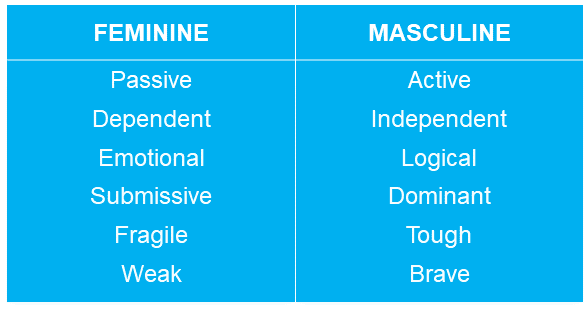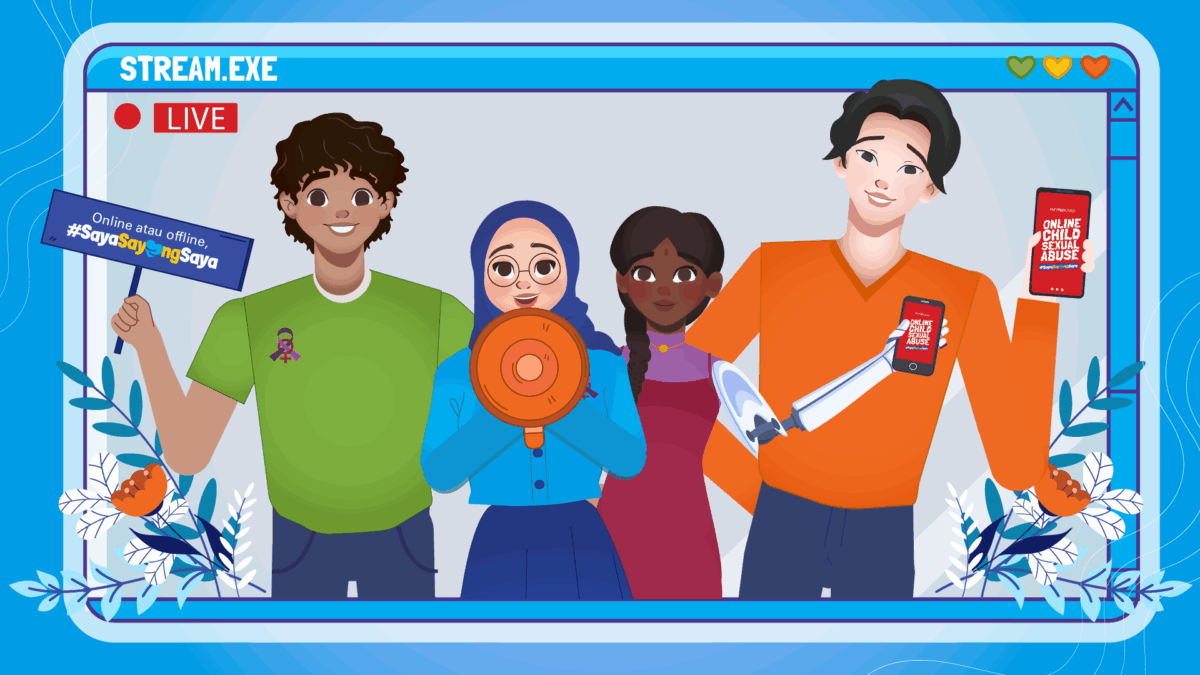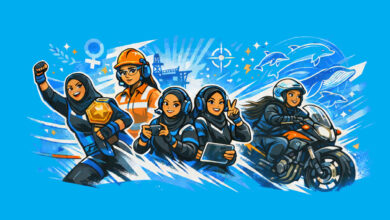Aqilah is so mad! Dah jadi norm to read stories of girls and women being sexually harassed, exploited or abused – not just offline but online juga. With 16 Days of Activism Against Gender-Based Violence just around the corner, it got me wondering … Why are these stories mostly about girls and women, even amongst my own circle of friends?
Almost all my girlfriends, including myself, have had some horrible online experience, many repeatedly through our teen years. Body shamed, stalked, sexually harassed, cyber-flashed, receiving obscene, pornographic content, pressured to send sexually explicit pics, having our pics and videos shared non-consensually. Take your pick. We’ve each had at least one of this happen to us. One girlfriend even received rape threats since some guys didn’t like her activism on women’s rights.
In comparison, only a couple of my male friends had similar experiences.
Why are the majority of victims’ girls and women?
Blame it on gender inequality and harmful gender norms, where boys are valued more than girls. The root cause of violence takes forms in discrimination, gender stereotypes and sexism. Here are some reasons Aqilah feel that contribute to gender-based violence here in Malaysia and around the world:

1. Condoning violence against girls and women
Enabling boys to not take accountability for their actions is dangerous. This includes over-normalising dialogues, macam, “boys will be boys” or victim blaming like, “you were asking for it with the way you dress”. (Disgusting, i know)
2. Limitations to girls’ independence
Most relationships offer a power dynamic where boys are the ones wearing the pants. This condones the idea that girls have less independence and power, thus suggesting that they are not worthy of respect. (so not true!)
3. Gender roles stereotypes
Girls and boys have been forced to fit into gender roles since the beginning of time. Which is super outdated, to begin with! Like hello?? This serves zero benefits to girls sebab that supposedly belong to the feminine side are very dismissive and insulting. And when women exhibit the so-called masculine traits, like being tough and active, they are portrayed as arrogant and bullies.

4. Brotherhood solidarity
It becomes a major threat against girls worldwide bila boys refuse to hold their brothers accountable. In fact, the masculinity-driven fraternising also leads to sexual boasting where girls are seen as a trophy.
READ >> How Violence Against Girls Became A Thing
What does Gender-Based Violence look like online?
Gender-Based Violence is just as real online, as it is offline. But unlike IRL, victims are forced to go through the trauma setiap hari. As long as a photo or video is still online, it will continue to circulate the virtual world sampai la bila-bila retraumatising the victim again and again.
Violence against girls and women can take many forms including cyber-harassment, revenge porn and threats of rape, sexual assault or murder. The perpetrators can be partners or ex-partners, peers, workmates and of course, random anons. Some examples of online Gender-Based Violence yang happen to my friends include:
Doxing
Although ‘Dropping-Dox’ may sound like a cool term, the impact is not so much. Basically doxing means publicly exposing someone’s personal info – like real name, address, phone number, school or workplace details, usually on the internet. Doxing happens without a victim’s consent, with an intent to expose information meant to stay private. This can seriously put the victims’ physical and mental safety at risk.
Revenge-porn
Simply put, revenge porn is the sharing and distribution of sexually explicit pictures or videos without a person’s consent, usually when a relationship turns sour. Selalu terjadi after a bad break up where the abuser tries to take vengeance and ‘punish’ the victim for leaving the relationship. Sextortion meanwhile is when abusers gunakan sexually explicit content as a blackmail to demand financial or sexual favours.
Sexual objectification
Abusers would always try to pass online sexual objectification as a form of ‘compliment’. Doesn’t mean it’s true. In fact, it’s far from a compliment. Regardless of the way you present yourselves, there will always be a creep lurking in your comments.
This traumatic experience may leave girls and women with negative effects like limiting their right to express themselves freely and also loss of self-esteem. Worst case scenario, non-consensual sharing and posting of victims’ content and information can also lead to serious risk of physical safety.
Boys and Men can help end Gender-Based Violence

While boys are not exempt form sexual violence, it’s important to remember that the majority of the perpetrators of sexual violence are also boys and men. So let’s start holding your brothers accountable. By refusing to call them out, you are also enabling them to continue causing violence to girls and other boys.
- Create a safer environment – If a person opens up to you about their abuse, do not victim-blame them by saying things like, “Are you sure you said no to them?”
- Say no to toxic masculinity. Start with challenging assumptions and beliefs about how boys are supposed to act.
- Understand and practise consent – Any sexual activity without consent is considered an abuse or harassment, learn more about consent kat sini.
If you’re experiencing abuse, or have been a victim of online, or offline violence, here’s a list of hotlines yang korang boleh call to get the professional help you need:
- National 24/7 Hotline – TalianKasih: Call 15999
- Report obscene content to the MCMC Content Forum
- Report online child sexual abuse content to Internet Watch Foundation
CHECK OUT >> the Ultimate Hotlines List from UNICEF Malaysia 💙
View this post on Instagram
Through ups and downs, Aqila got your back and so does Johor Darul Ta’zim FC! Kalau korang nak join and show your support against Online Sexual Abuse and Exploitation, be sure to head over to @unicefmalaysia (link in bio) and download your copy of #MyRedCard! Jom sama2 kita send off fouls against sexual predators online, and offline. Always remember, online atau offline, saya sayang saya. 💙
PSSST. If you have time, check out UNFPA’s The Virtual is Real campaign.




